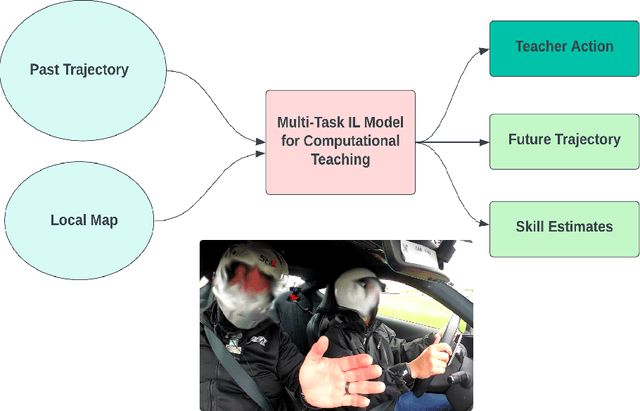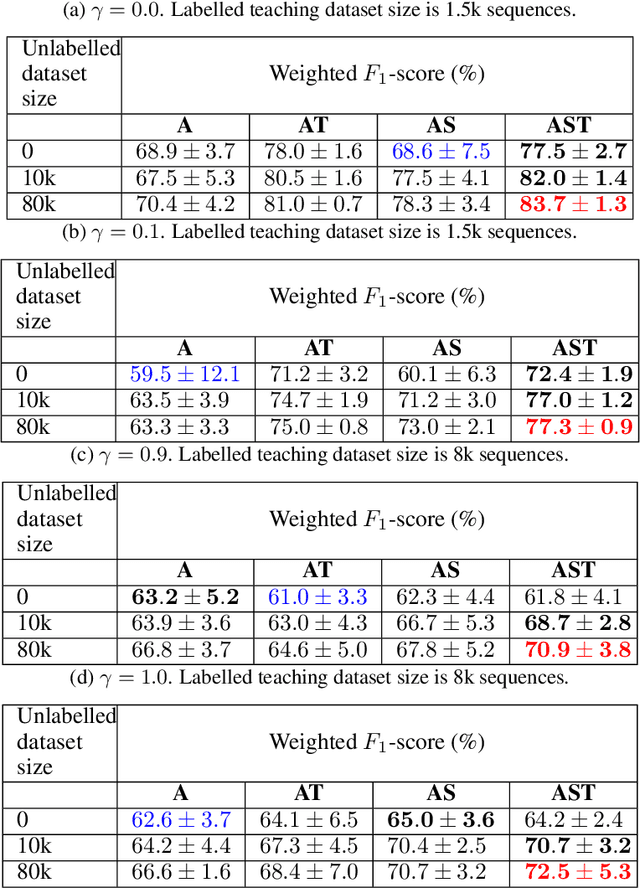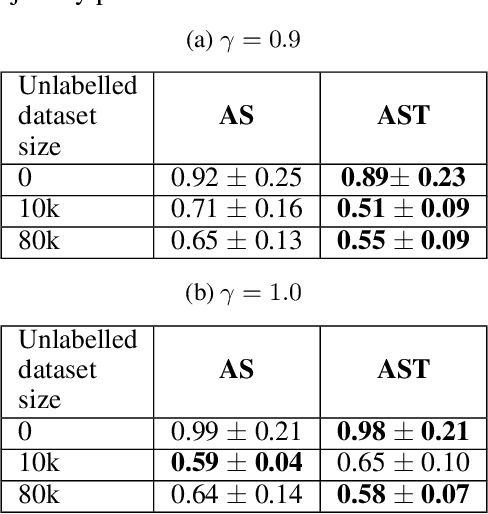Jean Costa
SimCoachCorpus: A naturalistic dataset with language and trajectories for embodied teaching
Sep 18, 2025Abstract:Curated datasets are essential for training and evaluating AI approaches, but are often lacking in domains where language and physical action are deeply intertwined. In particular, few datasets capture how people acquire embodied skills through verbal instruction over time. To address this gap, we introduce SimCoachCorpus: a unique dataset of race car simulator driving that allows for the investigation of rich interactive phenomena during guided and unguided motor skill acquisition. In this dataset, 29 humans were asked to drive in a simulator around a race track for approximately ninety minutes. Fifteen participants were given personalized one-on-one instruction from a professional performance driving coach, and 14 participants drove without coaching. \name\ includes embodied features such as vehicle state and inputs, map (track boundaries and raceline), and cone landmarks. These are synchronized with concurrent verbal coaching from a professional coach and additional feedback at the end of each lap. We further provide annotations of coaching categories for each concurrent feedback utterance, ratings on students' compliance with coaching advice, and self-reported cognitive load and emotional state of participants (gathered from surveys during the study). The dataset includes over 20,000 concurrent feedback utterances, over 400 terminal feedback utterances, and over 40 hours of vehicle driving data. Our naturalistic dataset can be used for investigating motor learning dynamics, exploring linguistic phenomena, and training computational models of teaching. We demonstrate applications of this dataset for in-context learning, imitation learning, and topic modeling. The dataset introduced in this work will be released publicly upon publication of the peer-reviewed version of this paper. Researchers interested in early access may register at https://tinyurl.com/SimCoachCorpusForm.
Computational Teaching for Driving via Multi-Task Imitation Learning
Oct 02, 2024



Abstract:Learning motor skills for sports or performance driving is often done with professional instruction from expert human teachers, whose availability is limited. Our goal is to enable automated teaching via a learned model that interacts with the student similar to a human teacher. However, training such automated teaching systems is limited by the availability of high-quality annotated datasets of expert teacher and student interactions that are difficult to collect at scale. To address this data scarcity problem, we propose an approach for training a coaching system for complex motor tasks such as high performance driving via a Multi-Task Imitation Learning (MTIL) paradigm. MTIL allows our model to learn robust representations by utilizing self-supervised training signals from more readily available non-interactive datasets of humans performing the task of interest. We validate our approach with (1) a semi-synthetic dataset created from real human driving trajectories, (2) a professional track driving instruction dataset, (3) a track-racing driving simulator human-subject study, and (4) a system demonstration on an instrumented car at a race track. Our experiments show that the right set of auxiliary machine learning tasks improves performance in predicting teaching instructions. Moreover, in the human subjects study, students exposed to the instructions from our teaching system improve their ability to stay within track limits, and show favorable perception of the model's interaction with them, in terms of usefulness and satisfaction.
Learning Racing From an AI Coach: Effects of Multimodal Autonomous Driving Explanations on Driving Performance, Cognitive Load, Expertise, and Trust
Jan 10, 2024Abstract:In a pre-post experiment (n = 41), we test the impact of an AI Coach's explanatory communications modeled after the instructions of human driving experts. Participants were divided into four (4) groups to assess two (2) dimensions of the AI coach's explanations: information type ('what' and 'why'-type explanations) and presentation modality (auditory and visual). We directly compare how AI Coaching sessions employing these techniques impact driving performance, cognitive load, confidence, expertise, and trust in an observation learning context. Through interviews, we delineate the learning process of our participants. Results show that an AI driving coach can be useful for teaching performance driving skills to novices. Comparing between groups, we find the type and modality of information influences performance outcomes. We attribute differences to how information directed attention, mitigated uncertainty, and influenced overload experienced by participants. These, in turn, affected how successfully participants were able to learn. Results suggest efficient, modality-appropriate explanations should be opted for when designing effective HMI communications that can instruct without overwhelming. Further, they support the need to align communications with human learning and cognitive processes. Results are synthesized into eight design implications for future autonomous vehicle HMI and AI coach design.
 Add to Chrome
Add to Chrome Add to Firefox
Add to Firefox Add to Edge
Add to Edge